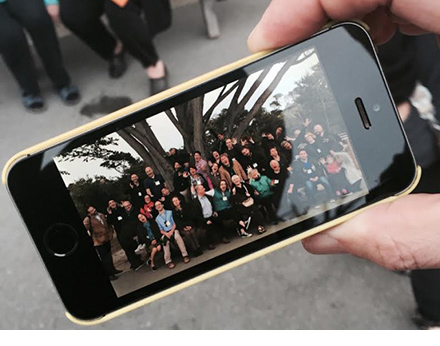
[The following is an article I wrote for the online magazine Kidscreen, June 1, 2016.]
Every year at the end of May, between the Google IO and the Apple Developer Conference in San Francisco, roughly 50 talented and passionate children’s app developers meet to hear the latest industry news, view upcoming apps and discuss best practices for mobile development. And last week’s seventh-annual AppCamp conference in Monterey, California was no different. What has changed, though, is the kids mobile market.
You would think with the latest industry news of Toca Boca’s acquisition by Spin Master, and Age of Learning receiving a US$150 million investment, that the bright sunny skies of Monterey were foreshadowing the future of the industry.
But opening discussions at the conference, which were led by many successful developers, painted a very different picture, as concerns about sustainability, lack of monetization, discovery and growth were top of mind.
Having a successful app, or a portfolio of successful apps, is often not enough to provide sustainable revenue for a company. It’s become clear that in order to survive, app developers need to diversify their offerings beyond mobile. Licensing of intellectual property, app bundles, toys and television are all helpful ways to create stability and sustainability, though each requires its own set of expertise and ongoing cultivation in order to succeed.
Regular AppCamp speaker and Toca Boca co-founder Björn Jeffrey shared that while his company enjoys a rare and privileged place in the children’s app world, it has been actively diversifying its offerings. Toca Boca has been building a new interactive television subscription service scheduled to launch in the fall, and it has also pursued developing new toy products through its Sago Mini subsidiary based in Toronto. Toca Boca also actively seeks out other partnerships and licensing opportunities, as Björn believes the industry will continue to see consolidation in the app space. He’s also concerned about a current “app fatigue†in the marketplace.
Valérie Touze, co-founder of Edoki Academy in Paris, echoed Björn’s sentiments. Touze, who specializes in creating Montessori apps, strongly believes that developers can’t rely on the slim chance that Apple will feature their apps─a rare opportunity that provides a brief boost in sales, and something that a developer can’t control nor request. Diversification, Touze believes, will help avoid disappointment.
Industry vet Mark Schlichting, founder of NoodleWorks and a key creative on the Living Books series from yesteryear publisher Brøderbund, noted that we’re in a mature market. With any sector, there is a rise, a plateau and a fall. This happens with every media platform: CD-ROMs, console devices, electronic handheld games─and now, children’s apps? We’re either at a plateau, or just starting to see a decline, depending on how you look at this maturing industry. Unlike the early days of the App Store, nowadays there’s a predominance of big companies and big licensed brands. For companies that can afford to make such apps, these businesses may not be focused on generating revenue, but rather care more about generating brand visibility, brand engagement and cross-promotion of other non-app products.
Dan Russell-Pinson, president of Freecloud Design, and the creator of the mega app hit Stack the States, believes there’s an “excitement gap†occurring as well. When the iPad launched in 2010, there was a hunger for apps, which were an exciting thing to download, share and talk about. Now, apps are commonplace. While Dan said he continues to release new mobile games simply to maintain his existing revenue base, he believes the market is supportive of price increases, moving up from US$1.99 to US$2.99, or US$2.99 to US3.99 per download.
French developer Pierre Abel of L’Escapadou, a pioneer in the app industry who shares all of his app metrics and sales data in his L’Escapadou blog, talked about the challenges of being a small developer. Abel offered this thought with which he and many other small studios struggle: Is it more important to create new apps for new revenue streams, or should a developer focus on updating one’s existing library of apps? It’s often impossible for a small studio to do both at the same time.
While app industry roadblocks abound, Google Play insider Shazia Makhdumi noted that similar challenges occur in other markets, such as the book world, the music industry and even children’s television. These industries have seen similar problems with monetization, discovery, advertising, visibility and audience-building. Could it be that the children’s app world, along with its many challenges, is simply following a similar pattern to other, more established media industries? And as the sector matures, are new ways of monetizing—say through subscription (or dare we say even advertising)—providing new financial opportunities and stability?
There are, of course, slivers of sunshine.
AppCamp attendees were treated to sneak previews of mobile products that will hit the market in the coming months from the likes of StoryToys, Kindoma, Originator and Edoki Academy. The level of innovation in these apps was impressive and extremely high. What was being shown will certainly raise the creative bar for the rest of the industry. It also provided a glimpse into what success in the children’s app world will look like in the future, at least in terms of quality and features─if not revenue.
The next gathering of the children’s app industry will occur at the 16th-annual Dust or Magic Conference in early November. At that time, the industry will collectively compare notes again, evaluate what has worked, discuss what needs more attention, and hopefully see some positive steps forward with new subscription-based business models that will likely grow in popularity.
Scott Traylor is the founder of 360KID and a consultant to many children’s interactive businesses and products (none of which are referenced in this article). He’s also a former computer science teacher and currently lives in Silicon Valley, searching for the next big opportunity in the children’s industry. Scott can be reached at Scott@360KID.com.



